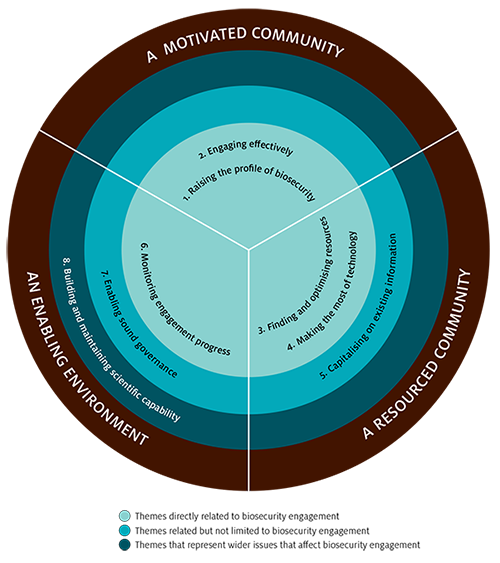
There is increasing acceptance that biosecurity is a shared responsibility between government, industry and the community. Australians from all walks of life can contribute to maintaining Australia’s favourable biosecurity status by complying with best biosecurity practice (for example, not taking fresh produce into pest-free areas and controlling pests in backyard fruit trees); and helping address biosecurity issues (for example, reporting suspected exotic pests, weeds or diseases or becoming volunteer pest monitors).
This raises the question of how the broader community could play a more active role in addressing such biosecurity issues and how best to gain their interest and support for biosecurity-related practices and activities.
The Engaging in Biosecurity project (May 2008 – February 2012) investigated how to strengthen community engagement to address biosecurity issues. It developed a proposed National Plant Biosecurity Engagement Framework, as well as a number of other products (guidelines, information sheets and checklists) that contribute to more effective community engagement on biosecurity issues.
The guidelines include a discussion of key social enablers and barriers to effective biosecurity engagement, principles to help choose and develop engagement tools, and how to develop a community engagement strategy. The information sheets discuss matters such as what to consider when establishing a volunteer group and ways to recruit and retain volunteers.
Several key themes emerged from the research, categorised into eight ‘strategic pillars’ necessary to support a national biosecurity engagement approach.
The eight pillars are grouped under three broader headings or ‘cornerstones’ that underpin effective community engagement for biosecurity purposes:
-
A motivated community
- Raising the profile of biosecurity
- Engaging effectively
-
A resourced community
- Finding and optimising resources
- Making the most of technology
- Capitalising on existing information
-
An enabling environment
- Monitoring engagement progress
- Enabling sound governance
- Building and maintaining scientific capability
This work was undertaken by ABARES to inform the development of a proposed national action plan for community engagement about plant biosecurity. The Department of Agriculture has since published a National Biosecurity Engagement and Communication Framework.
Resources
- National Biosecurity Engagement and Communication Framework
- Developing a national action plan for community engagement about plant biosecurity — Consultation summary report
- Biosecurity engagement: Literature review
- Biosecurity engagement: Gap analysis
- Volunteer monitoring in biosecurity: An issues paper
